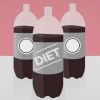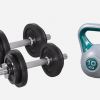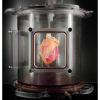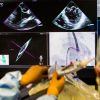-
 +15 +1
+15 +1Middle-Age Men Who Can Do 40+ Push-Ups Have Lower Heart Disease Risk
A new study finds that active middle aged men who can do more than 40 push-ups at a time have a significantly lower risk of heart disease.
-
 +16 +1
+16 +1Saturated fat does not clog the arteries: coronary heart disease is a chronic inflammatory condition, the risk of which can be effectively reduced...
Coronary artery disease pathogenesis and treatment urgently requires a paradigm shift. Despite popular belief among doctors and the public, the conceptual model of dietary saturated fat clogging a pipe is just plain wrong. A landmark systematic review and meta-analysis of observational studies showed no association between saturated fat consumption and (1) all-cause mortality, (2) coronary heart disease (CHD), (3) CHD mortality, (4) ischaemic stroke or (5) type 2 diabetes in healthy adults.
-
 +7 +1
+7 +1The Truth About Heart Disease & Cholesterol - Dwight Lundell
A heart surgeon tells it like it is.
-
 +15 +1
+15 +1Drinking two or more diet beverages a day linked to high risk of stroke, heart attacks
More bad news for diet soda lovers: Drinking two or more of any kind of artificially sweetened drinks a day is linked to an increased risk of clot-based strokes, heart attacks and early death in women over 50, according to a new study by the American Heart Association and American Stroke Association. The risks were highest for women with no history of heart disease or diabetes and women who were obese or African-American.
-
 +42 +1
+42 +1Drinking two or more diet sodas a day linked to high risk of stroke, heart attacks
Drinking two or more diet sodas a day is linked to an increased risk of stroke, heart attacks and early death in women over 50, a new study says. The risk was highest for obese and African American women.
-
 +11 +1
+11 +1Climate change could hurt babies' hearts, study says
Heat and pregnancy do not mix. High temps don't just make a pregnant woman uncomfortable, the heat can actually hurt the health of her baby -- and with climate change, this will probably become a bigger problem.
-
 +15 +1
+15 +1Mental Image of Loved One Can Keep Down Blood Pressure
The news has been rough lately. The government is shut down, resulting in thousands of government workers going without pay. Teenage Trump supporters are staring down Native American leaders, making people on both sides profoundly uncomfortable. It’s hard to read the news today and not have your blood pressure spike. Luckily, a new study in the journal Psychophysiology provides us with a strategy to keep our hypertension in check: Just think about your loved one.
-
 +30 +2
+30 +2My Life After a Heart Attack at 38
In an instant, I didn’t know if I’d get to see my daughter turn 6.
-
 -1 +1
-1 +1We need God in our lives and through our suffering.
Why do we need God in the middle of our suffering?
-
 +31 +1
+31 +1Weightlifting is good for your heart and it doesn't take much.
Lifting weights for less than an hour a week may reduce your risk for a heart attack or stroke by 40 to 70 percent, according to a new study. Spending more than an hour in the weight room did not yield any additional benefit, the researchers found. The results show benefits of strength training are independent of running, walking or other aerobic activity.
-
 +17 +1
+17 +1Scientists Achieve Breakthrough on Path to Pig-to-Human Heart Transplants
Although 54 percent of adults in the United States have registered as organ donors, just one in three people die in a way that allows for organ donation. That leaves more than 100,000 people in the United States waiting for a transplant. Many will die waiting. Because demand for organs outpaces supply and probably always will, researchers have looked to xenotransplantation — placing animal organs into human bodies — as an alternative.
-
 +8 +1
+8 +1The Implant Files: a global investigation into medical devices - ICIJ
Health authorities across the globe have failed to protect millions of patients from poorly tested implants, the first-ever global examination of the medical device industry reveals.
-
 +22 +1
+22 +1Scientists Grow Full-Sized, Beating Human Hearts From Stem Cells
Of the 4,000 Americans waiting for heart transplants, only 2,500 will receive new hearts in the next year. Even for those lucky enough to get a transplant, the biggest risk is the their bodies will reject the new heart and launch a massive immune reaction against the foreign cells. To combat the problems of organ shortage and decrease the chance that a patient’s body will reject it, researchers have been working to create synthetic organs from patients’ own cells.
-
 +32 +1
+32 +1Western lifestyle may cause blood pressure to rise with age
Study of remote communities in Venezuelan rainforest sheds fresh light on hypertension
-
 +13 +1
+13 +1Study: E-cigarettes may damage the heart
New research shows that electronic cigarettes contain chemicals that cause heart damage, adding to the growing list of concerns about their safety. The study, which will be presented next Monday at the American Heart Association's Scientific Sessions meeting in Chicago, investigated the effect that e-cigarettes have on the endothelial cells that line the inside of the body's blood vessels. Endothelial cells produce nitric oxide, a molecule that helps keep blood vessels healthy and control blood pressure levels.
-
 +19 +1
+19 +1Experimental vaccine may reduce post-stroke blood clot risk | American Heart Association
A vaccine may one day be able to replace oral blood thinners to reduce the risk of secondary strokes caused by blood clots, without increasing the risk of serious bleeding or triggering an autoimmune response, according to new research in the American Heart Association’s journal Hypertension.
-
 +16 +1
+16 +1Walmart Files Patent For Carts That Track Your Heart Rate
It also stores various biometric and location data, rousing inevitable privacy concerns.
-
 +8 +1
+8 +1'Game-changing' study finds DNA patterns that raise heart attack risk
Scientists are a big step closer to creating a fast, affordable DNA test to predict your risk of heart attack.
-
 +17 +1
+17 +1'Game-changing' study finds DNA patterns that raise heart attack risk
Scientists know genes are responsible for roughly half your chance of having a heart attack, but they didn't know which genes were important. Now, in a huge world-first study, Australian scientists say they have discovered the DNA patterns that can raise our risk. People with high-risk DNA are more than four times more likely to have a heart attack than people with low-risk DNA, their study reveals.
-
 +35 +1
+35 +1Tiny Device Is a ‘Huge Advance’ for Treatment of Severe Heart Failure
A clip used to repair damaged heart valves sharply reduced deaths among patients with a grim prognosis.
Submit a link
Start a discussion




















